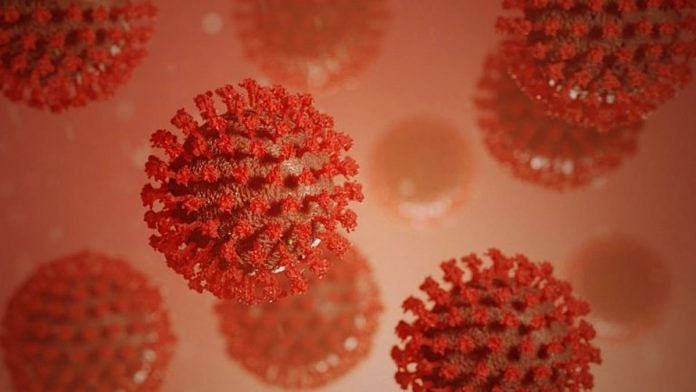New Delhi: In a first, scientists from the Indian Veterinary Research Institute (IVRI) have detected Covid infection in a dead leopard cub in Uttar Pradesh. Genomic sequencing of samples from the carcass of the cub revealed that it had been naturally infected with the Delta variant.
According to the team, the finding points to the possible spillover of the infection from humans to free-ranging animals. The case was detected after infection levels had dropped significantly in human populations.
The report, posted on bioRxiv, a preprint server for biological studies, on 12 January, underlines the need for intensive screening of wild animals to keep track of the virus’s evolution and the development of carrier status of SARS-CoV-2 among wildlife species.
“We found that this cub had Covid infection, but it did not die of Covid. However, we did find that the pathogenesis of the infection in leopards is similar to what is seen in humans,” one of the researchers, Gaurav Sharma, told ThePrint.
“However, we do not yet consider this to be an animal reservoir, since the infection is not widespread and animals do not seem to be transmitting among one another,” Sharma said.
An animal is considered to be a viral reservoir when a pathogen survives in the animal population for a long time, causing a risk of spillover infections to humans in future.
However, Sharma said that it’s important to find out how the cub was infected with the Delta variant at a time when infection numbers in human populations were relatively low.
Virus detected in free-ranging animal for first time
The carcass of the male leopard cub, estimated to be just about a year old, was recovered during routine combing in the agricultural fields of Mojipur village in the Social Forestry Division of Bijnor, Uttar Pradesh.
Bijnor Social Forestry Division includes approximately 14,400 hectares of reserve forest located in the foothills of the Himalayas. There’s sugarcane cultivation — which favours the habitation of wild herbivores and carnivores — in around 70 per cent of the inhabited land.
The carcass was submitted to the Indian Agricultural Research Institute (ICAR)-IVRI for necropsy examination. During the examination, the team found canine teeth marks piercing the cub’s neck, contusions under the skin and haemorrhages on the neck and head — suggesting a case of infighting.
The team also observed signs of congestion in the lungs. Rectal and nasopharyngeal swabs, and tissue samples from various organs, were collected and subjected to routine laboratory investigations.
The nasal swab was found to be positive for SARS-CoV-2 by RT-PCR.
Researchers said the high resemblance of spike protein sequences to that of the Delta variant in humans suggests possible spillover infection. The team found no major genetic changes in the spike protein of the virus after it had infected the leopard cub.
Puzzling findings
This is the first time that the virus has been detected in a free-ranging animal in India. The team is puzzled by the findings as the prevalence of Covid in humans wasn’t high when this case was detected.
While nasal samples from animals in captivity can be routinely taken and tested for SARS-CoV-2, monitoring animals in the wild is more difficult. Researchers have been taking samples from carcasses.
In cases of animals in captivity, researchers assume that they were likely exposed to the virus from human handlers. Sharma also noted that free-ranging animals sometimes go to human dwellings and may become exposed to Covid-infected people.
(Edited by Rohan Manoj)
Also read: Most of Covid virus ‘inactivated’ in minutes, says UK study on aerosol risk at short distance



